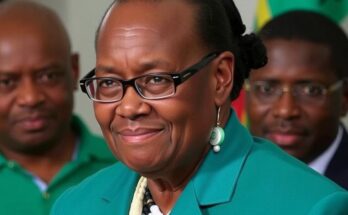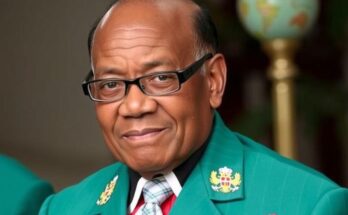Tunisian President Kais Saied is projected to achieve a significant electoral victory with 89.2 percent, amidst a backdrop of low voter turnout of less than 30 percent. His unchallenged opponents reflect a political environment tainted by voter apathy and allegations of authoritarian practices, as the country grapples with economic challenges and the opposition’s denouncement of the elections as illegitimate.
In Tunisia’s recent presidential election, President Kais Saied is anticipated to secure a decisive victory, polling at 89.2 percent according to an exit survey revealed by state television. This result would reinforce Saied’s authority, which has grown since he centralized power in 2021. Official results are slated for release later on Monday. However, the election has been marred by significant voter apathy, with less than 30 percent of eligible voters participating in what marks the third presidential election since the 2011 Arab Spring. President Saied faced two challengers: imprisoned businessman Ayachi Zammel and former ally Zouhair Maghzaoui, representing a leftist perspective. Given the marginalization or imprisonment of these opponents, Saied’s victory is all but assured. Saied, a legal scholar turned politician, ascended to his position by exploiting widespread dissatisfaction with the established political dynamics that emerged post-Arab Spring. His tenure has been characterized by economic challenges, notably following his suspension of parliament in 2021 and the overhaul of the constitution. The opposition has vocally rejected the legitimacy of these elections, labeling them a mere farce. Although there had been interest from various figures to run against Saied, only three candidates were approved for the ballot by an election commission appointed exclusively by the president. By the culmination of voting, only 2.7 million participants had cast their votes, representing a mere 27.7 percent voter turnout, a stark decline from the previous election’s 49 percent. The ascension of authoritarian practices under Saied’s governance has raised alarms. Two years into his presidency, he implemented a unilateral dissolution of parliament, leading to his current rule by decree, which many in the opposition describe as a coup. In stating his resolve, Saied has asserted he will not yield power to what he terms “non-patriots,” and, when announcing his candidacy, he refuted any claims of imposed restrictions on potential challengers, reiterating, “whoever talks about restrictions is delusional.” Concerning Tunisia’s economic climate, the nation is grappling with substantial public debt, which has surged to above 80 percent of its GDP compared to less than 40 percent in 2010, before the Arab Spring. Additionally, the current account deficit has reached 15 percent of GDP, exacerbated by soaring prices of imported essentials amid global inflation and the ongoing repercussions of the Russia-Ukraine conflict.
The context of this article revolves around Tunisia’s ongoing political evolution following the 2011 Arab Spring. The uprising aimed to dismantle autocratic governance and promote democratic principles. However, the current political scenario under President Kais Saied has been marked by a shift towards authoritarianism, raising concerns about the integrity of electoral processes and democratic institutions. Saied’s ascent to power was initially rooted in a desire for reform, but his subsequent actions have led to widespread critique regarding public apathy, diminishing civil liberties, and economic hardships exacerbated by global economic factors and local governance strategies.
In summary, Tunisia’s presidential elections reflect a troubling trend toward increased autocracy under President Kais Saied, who appears poised for reelection amidst historical low voter turnout. His consolidation of power poses significant challenges for the country’s democratic trajectory, as economic difficulties continue to worsen in the backdrop of widespread voter disillusionment. The opposition’s attempts to contest his governance are hindered by systemic restrictions, further highlighting the critical state of Tunisia’s political and economic landscape in the post-Arab Spring era.
Original Source: www.middleeasteye.net




